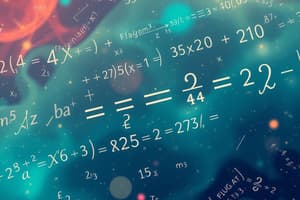Podcast
Questions and Answers
What does the exponent 3 in the expression 2^3 represent?
What does the exponent 3 in the expression 2^3 represent?
According to the product of powers rule, what is the result of (3^2) * (5^3)?
According to the product of powers rule, what is the result of (3^2) * (5^3)?
What is the quotient of (4^6) divided by (4^3)?
What is the quotient of (4^6) divided by (4^3)?
What is the result of (5^4)^3?
What is the result of (5^4)^3?
Signup and view all the answers
What is the value of 7^0?
What is the value of 7^0?
Signup and view all the answers
What is the value of 9^(-2)?
What is the value of 9^(-2)?
Signup and view all the answers
If x^4 = x^6, what can be concluded about x?
If x^4 = x^6, what can be concluded about x?
Signup and view all the answers
If y^(p+q) = y^(p-q), what can be concluded about y?
If y^(p+q) = y^(p-q), what can be concluded about y?
Signup and view all the answers
What happens to the value of a^(n-1) as n becomes increasingly large?
What happens to the value of a^(n-1) as n becomes increasingly large?
Signup and view all the answers
If b and c are two numbers and p and q are two integers, what is the result of $b^{(p+q)} / b^{(p-q)}$?
If b and c are two numbers and p and q are two integers, what is the result of $b^{(p+q)} / b^{(p-q)}$?
Signup and view all the answers
Study Notes
Maths: Exponents
Exponent Rules
Exponents are used to represent repeated multiplication of a given number. The number being multiplied is called the base, and the number of times it is multiplied is called the exponent. In mathematical notation, the exponent is written as a superscript above the base. For example, 2^3 represents 2 multiplied by itself three times.
There are several rules for working with exponents:
- Product of powers: If a and b are two numbers and m and n are two integers then (a^m) * (b^n) = (a * b)^(m + n)
- Quotient of powers: If a and b are two numbers and m and n are two integers then (a^m) / (b^n) = a^m / b^n = a^(m - n) if m > n and a^(m - n) / b^n if m < n
- Power of a power: If a is a number and m and n are two integers then (a^m)^n = a^(m * n)
- Zero exponent: If a is a non-zero number then a^0 = 1
- One exponent: If a is a non-zero number then a^1 = a
- Negative exponent: If a is a non-zero number and n is an integer then a^(-n) = 1 / a^n
Negative Exponents
A negative exponent is a value that indicates the base is to be raised to the power of the reciprocal of the exponent. In other words, if a number is raised to the power of a negative exponent, it is the reciprocal of the base raised to the power of the absolute value of the exponent. This rule is known as the rule for negative exponents.
For example, 2^(-3) represents 2 multiplied by itself three times, but in reverse order. So, 2^(-3) = 1 / (2 * 2 * 2) = 1 / 8.
In general, if a is a non-zero number and n is an integer, then a^(-n) = 1 / a^n. This rule can be derived from the quotient of powers rule for exponents, which states that (a^m) / (b^n) = a^(m - n) if m > n and a^(m - n) / b^n if m < n. If we take a = b and n = -m, we get a^(-m) = 1 / a^m.
Exponents are a powerful tool in mathematics, and understanding the rules for working with them is essential for solving a wide range of mathematical problems. By understanding the rules for exponents, including the rules for negative exponents, you can easily calculate the value of any expression involving exponents
Studying That Suits You
Use AI to generate personalized quizzes and flashcards to suit your learning preferences.
Description
Test your understanding of exponent rules, including product of powers, quotient of powers, power of a power, zero exponent, one exponent, and negative exponents. Learn to calculate the value of expressions involving exponents by mastering the rules for working with them.




